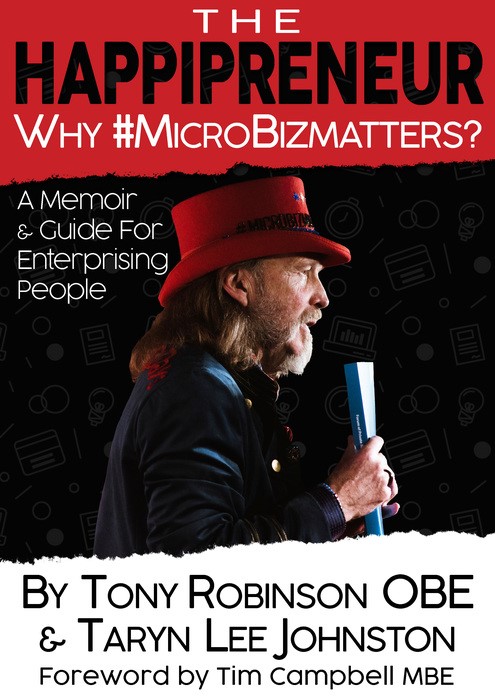
New book release dedicated to 3 million #ExcludedUK
A new resource for anyone who runs their own business - or is thinking of doing so - has been launched by one of the UK’s most prolific supporters of micro businesses. The Happipreneur - Why #MicroBizMatters? is 2020’s ultimate guide for enterprising people, dedicated to helping ambitious entrepreneurs with innovative ideas to achieve happiness and success by controlling their own destiny.
Available now, the book outlines the challenges that today’s small businesses face, and is dedicated to the 3 million taxpayers denied Government financial support during the pandemic.
The culmination of a two-year project by MicroBiz champion Tony Robinson, OBE and FCM Group Executive Director, Taryn Lee Johnston, Happipreneur - Why #MicroBizMatters? Is packed with practical guidance to help the UK’s estimated 5.6 million micro business owners survive and thrive, particularly during challenging times.
With a foreword by Apprentice winner Tim Campbell MBE, the book recognises the 10% of the country’s workforce - including the self-employed and owners and directors of enterprises with fewer than ten employees - who have been discriminated against through lack of COVID-19 income support.
#Payin30Days campaigner and Happipreneur - Why #MicroBizMatters? author Tony Robinson, OBE said: “Right now, it is more important than ever for micro business owners to work together to implement change. Over the past six months, we’ve witnessed very clearly the patronising, marginalising, and quite frankly bullying behaviour that is dished out by the Government. It has resulted in unfairness, injustice, discrimination and severe hardship at a time when the Government should really be doing all it can to support businesses, promote equality, and facilitate recovery of the UK economy.”
Robinson and Johnston have set out to reiterate the vital message of E.F. Schumacher’s influential 1973 book Small is Beautiful, with the goal of making this message the norm, not the exception. Believing that Schumacher would be ‘turning in his grave’ at the Government’s decision to deny necessary support to those who need it most, Happipreneur - Why #MicroBizMatters? is founded on the economics and social values underpinning the original, with a shift from writing about ‘economics as if people mattered’ to ‘enterprise as if people cared’.
Tony Robinson, OBE, has dedicated the past few months to fighting the injustice seen during the COVID-19 outbreak, and has been a strong and vocal supporter of #ExcludedUK; a not-for-profit campaign group that acts as an ‘inclusive alliance for the excluded’. It works to bring attention to the three million hard-working taxpayers denied income support from the Government and to provide them with practical help to survive this crisis. The group is calling for an end to the inequality in support measures.
Published on 27th August, Happipreneur - Why #MicroBizMatters? sets out to answer some of the biggest questions today, including ‘how can I become a happipreneur?’ and, perhaps most importantly, ‘why does microbiz matter?’. The book is a memoir and a guide for enterprising people and those that wish to help enterprising people.
Robinson's experience and learning from over 30 years of founding businesses and working with thousands of business owners including many of the UK's leading entrepreneurs are distilled into practical and essential business truths. The end result is a blueprint for happipreneurs everywhere.
Happipreneur - Why #MicroBizMatters? is available to purchase now from all good bookstores, including Waterstones, Book Depository and Amazon.

Robinson and Johnston have set out to reiterate the vital message of E.F. Schumacher’s influential 1973 book Small is Beautiful, with the goal of making this message the norm, not the exception. Believing that Schumacher would be ‘turning in his grave’ at the Government’s decision to deny necessary support to those who need it most, Happipreneur - Why #MicroBizMatters? is founded on the economics and social values underpinning the original, with a shift from writing about ‘economics as if people mattered’ to ‘enterprise as if people cared’.

